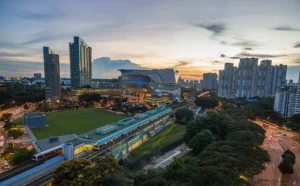In the ever-evolving landscape of real estate development, Gurgaon has emerged as a beacon of modernity and luxury. Among the key players in this transformation stands Ganga Realty, a luxury real estate brand that not only redefines opulence but also integrates cutting-edge technology to create a living experience that harmonizes with the city’s dynamic spirit.
Table of Contents
Technological Advancements in Construction Techniques
The construction industry is witnessing a seismic shift, with technology playing a pivotal role in enhancing efficiency, sustainability, and safety. Gurgaon’s skyline is now shaped by state-of-the-art construction techniques that leverage technology for precision and speed. From advanced machinery to augmented reality in project planning, technology has become an integral part of the construction process.
Ganga Realty, with its commitment to staying at the forefront of innovation, embraces these advancements in construction. The use of modular construction techniques, 3D printing, and Building Information Modeling (BIM) not only expedites the construction process but also ensures a higher degree of accuracy and quality in every structure they build.
Smart Homes
Beyond the construction phase, technology has permeated the interiors of residential projects in Gurgaon. Ganga Realty, with its motto “life is pure,” has redefined luxury living by seamlessly integrating technology into the amenities offered within residences. Smart home systems that control lighting, security, and climate with the touch of a button are now standard features.
Residents of Ganga Realty projects experience the convenience of home automation, where they can manage appliances, security systems, and energy consumption through their smartphones. This not only enhances the quality of life but also contributes to energy efficiency and sustainability.
Opulent Amenities
Ganga Realty takes pride in offering opulent amenities that blend purity with technological advancements. Expansive clubhouses within their projects serve as hubs of activity, equipped with state-of-the-art facilities. These facilities are not merely luxurious but are infused with technology to elevate the overall living experience.
From smart fitness centres with personalized workout plans to temperature-controlled swimming pools, Ganga Realty ensures that residents have access to the best-in-class amenities. Technologically advanced features such as biometric access, virtual concierge services, and integrated communication systems add an extra layer of sophistication to these spaces.
Green Living
In the pursuit of purity, Ganga Realty integrates greenery within its properties, creating an oasis in the midst of the bustling city. The use of technology extends to sustainable practices, such as rainwater harvesting, solar panels for energy generation, and smart irrigation systems for lush landscapes. Gurgaon, known for its urban sprawl, is witnessing a resurgence of green living spaces, thanks to these technological and eco-friendly initiatives.
Gurgaon’s Spirit of Modernity
The city of Gurgaon has long been synonymous with progress and modernity. Luxurious real estate projects with technological advancements embody the city’s spirit, catering to a demographic that seeks a perfect balance between contemporary living and a touch of nature. Ganga Realty’s projects seamlessly fit into this narrative, becoming a testament to Gurgaon’s evolution into a global city.
The Future Unveiled: Upcoming Project by Ganga Realty
Ganga Realty is set to raise the bar even higher with an upcoming project that promises to be the epitome of luxurious living. This project is conceived as the perfect amalgamation of technology and purity, offering residents an unparalleled experience in modern living. With cutting-edge features and a commitment to sustainability, this project is poised to become a benchmark for future real estate developments in Gurgaon.
Conclusion
As we witness the convergence of technology and real estate in Gurgaon, it’s clear that this integration is not just a trend but the future of the industry. Ganga Realty, with its unwavering commitment to purity and innovation, is pioneering this transformative journey. Their projects not only redefine opulence but also set a new standard for how technology can elevate the quality of life in residential spaces. In Gurgaon, the future of real estate is already here, and it bears the unmistakable signature of Ganga Realty.







